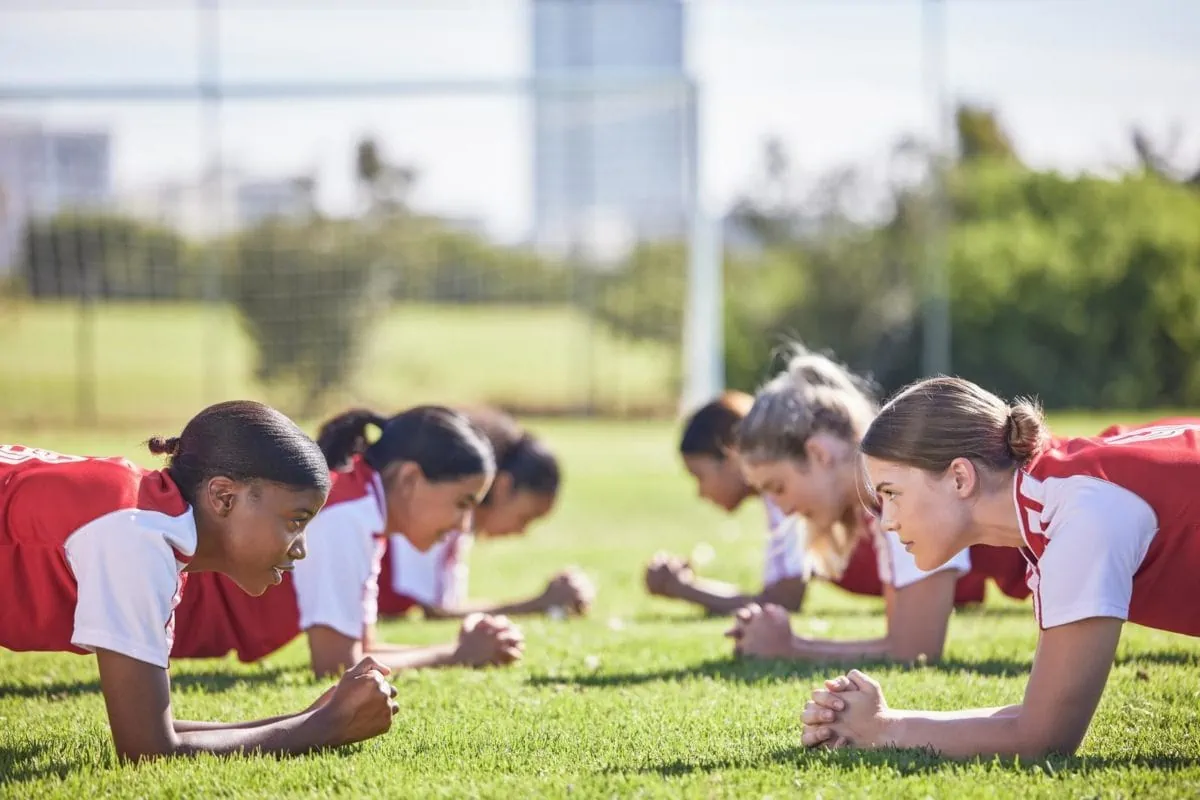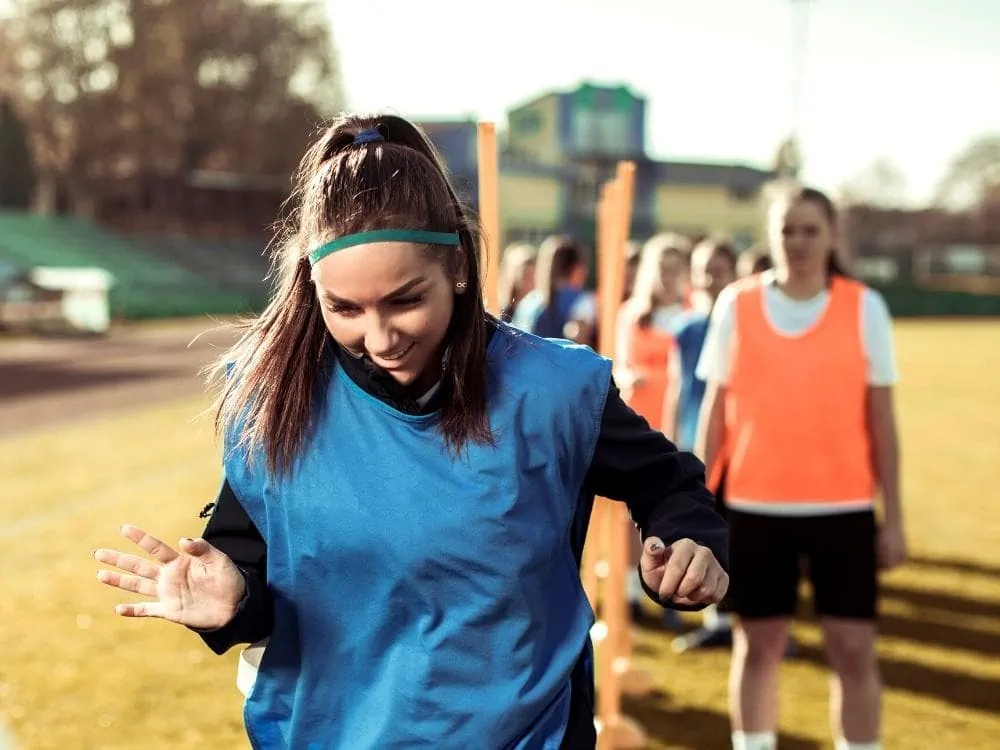Share the post "Play Soccer Without Getting Tired Easily!"
Soccer is a demanding game, both physically and mentally. You’re on the move for a full 90 minutes, which means you’ll need great physical conditioning.
That’s not all, you’ll be making decisions and solving problems throughout a game as well.
This combination is tiring, but we’ve got some tips for playing soccer without getting tired.
Some key points we’ll cover today are:
- Physical preparation
- Mental preparation
- Exercise and diet

How to play soccer without getting tired
You’ll want to work on your stamina to play soccer without getting tired. Stamina is the ability to go through prolonged physical and mental effort.
So, good stamina is a key factor for a demanding game like soccer.
Let’s look at 5 ways to improve stamina for soccer:
- Targeted exercises
- Game time
- Mental preparation
- Diet and hydration
- Warm-up
If you work on these 5 areas, you’ll be prepared to play soccer without getting tired. Please note these areas aren’t listed in order of importance. We think all 5 are equally important.

1. Targeted exercises
Jogging long distances might be suitable for building overall stamina, but we want a better way to build soccer stamina.
Think about how you move on the soccer field during a game. You’re jogging, sprinting, turning, jumping, etc.
- These movements are more varied than just jogging.
So, you’ll want to do exercises that mimic your movement on the soccer field. Once your body becomes familiar with such movements, your stamina for soccer will improve.
Think about it this way. If you jog at a steady pace for 1 hour, your body will get familiar with that activity. It’ll become good at it.
Short Sprints
But then if you play soccer, you’ll be doing a completely different activity level. Jogging at a steady pace won’t fully prepare you for those short sprints and other movements during a game.
Now, that’s not to say that jogging isn’t good. It’s just not the optimum exercise for soccer. Those soccer movements will tire you quickly if your body isn’t familiar with them.
So, targeted exercises for soccer are the best way to improve your stamina for playing games.
To get an idea of targeted exercises, check out the video below:
2. Game time
If you play soccer, you’ve likely heard the term game fitness. This means getting enough game time to play at the best possible level for 90 minutes.
Think about when a player hasn’t played soccer for a while. Maybe they’re coming back from injury. The coach will likely start them off with 20 minutes of game time, then build them up to the full 90 minutes.
That gives the player game time and allows them to build game fitness. So, to improve your stamina for soccer, you’ll want to get game time.
Stamina
Training with targeted exercises is a great way to build stamina. But nothing beats playing an actual game to prepare your body for the physical demands of soccer.
- Of course, all these things should be done together for the best results.
Along with your training, you’ll want to get as much game time as possible. That’ll set you up for success.
Game time not only builds your physical stamina, but it also builds your mental stamina. Let’s take a closer look at mental preparation now.

3. Mental preparation
As well as physical preparation, it would be best to have mental preparation for soccer to improve your stamina. Think of soccer as decision-making and problem-solving in a physically demanding environment.
You need to use your brain to make decisions and solve problems. Using your brain also burns energy and affects stamina.
So, you’ll want to train your brain for soccer, just like you train your body. An excellent way to do this is to train smart. That involves focusing on decision-making and problem-solving during your training sessions.
Know What To Expect
To work on mental preparation, it’s good to simulate real-game situations while training. This will get you familiar with different situations on the soccer field.
If you’re mentally prepared for different situations, you won’t have to think as much during a game. It’s about making your decisions second nature.
- You can do things on the soccer field without thinking about them consciously.
Preparing mentally in training helps you make decisions and solve problems without using too much energy to think about them. This means your stamina will improve because your brain isn’t working as hard to make decisions.
Of course, playing a game is a more intense version of that. So, game time is vital for mental preparation as well.
Watch this video for tips on mental preparation (it’s pretty long):
4. Diet and hydration
Diet and hydration are important for everyone. But they’re especially important for a physically and mentally demanding game like soccer.
You want to feed your body with the best fuel to help improve your stamina.
- Try to eat 3-4 hours before a game. It’ll give you time to digest your meal.
Playing soccer on a full stomach isn’t comfortable and can lead to cramps. Also, digesting food takes energy, affecting your stamina during a game.
Food Balance
You’ll want to get the right balance of carbohydrates, fats, and proteins in your diet. The ideal soccer player’s diet is 60% carbohydrate, 25% fat, and 15% protein.
Cristiano Ronaldo follows a strict diet that’s helped him stay at an extraordinary level for many years. For carbohydrates, he prefers fresh, whole-grain bread and pasta. He also eats plenty of fruits and vegetables.
Avocado is a healthy source of fat, so it’s a good choice for soccer players.
Ronaldo’s main source of protein is fish and eggs, with an occasional steak. And he supplements his protein with protein shakes.
He stays away from sugary drinks, preferring water instead. Check out this famous clip from Euro 2020 to see for yourself:
It’s super important to stay hydrated for soccer, so follow Ronaldo’s example and drink plenty of water.
Soccer players should drink about 7-14 ounces of water 10 minutes before kick-off. And during the half-time break, you should drink about 10 ounces of a sports drink to replenish electrolytes.
- You should drink about 5 ounces of water in hot-weather training sessions every 20 minutes.
Staying hydrated will help your heart fuel your muscles, helping your physical stamina. And it’ll keep your brain functioning at the best level, meaning your mental stamina won’t suffer.

5. Warm-up
It’s essential to warm up before any exercise, and soccer is no different. Warming up before a game or training helps your body prepare for physical activity. If you watch soccer, you’ll notice that players always warm up before a game.
This raises your body temperature and gets your muscles warm. Warm muscles help to prevent injury because they’re more elastic and absorb shock better.
Also, warming up helps your circulation. This means your body will be better at getting oxygen to your muscles, which helps to improve your stamina.
Brain and Body
And let’s not forget about the mental side of warming up. It gets your body and brain working together and preparing for the game.
You might have heard the saying: Get your head in the game. Warming up helps you with that.
If you’re focused before a game, it’ll help with your mental stamina.
So, warming up helps you improve your physical and mental stamina for soccer.
You can get warm-up ideas from this video:
Those are our 5 areas to focus on if you want to play soccer without getting tired. Follow these, and you’ll improve your physical and mental stamina for soccer.
But please remember that rest is essential, too. You don’t want to overdo it. Find the right balance for the best results.
Share the post "Play Soccer Without Getting Tired Easily!"
Joel is a seasoned soccer journalist and analyst with many years of experience in the field. Joel specializes in game analysis, player profiles, transfer news, and has a keen eye for the tactical nuances of the game. He played at various levels in the game and coached teams - he is happy to share his insight with you.



